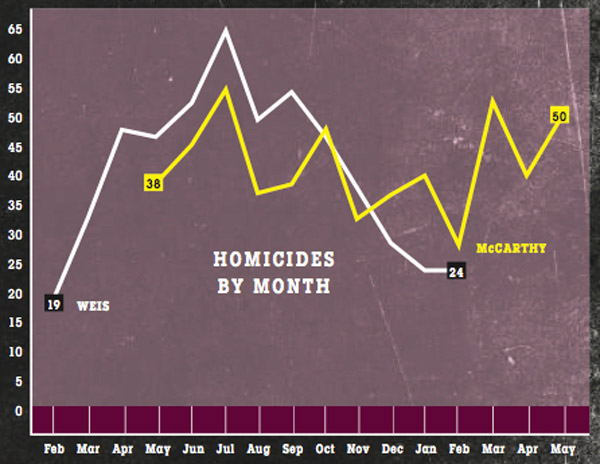A lot of sport has been made of the New York Times's most recent venture into Chicago ("the Windy City"), a process that usually ends unhappily for everyone. Michael Gebert described it as "an examination of Chicago's unique character, as conducted from a couple of expensive bars within walking distance of the Wrigley Building." Nothing makes Midwesterners angrier than calling them nice, one of the many maddeningly incorrect generalizations about the city ("places like Wicker Park and Bucktown with their… denim-and-flannel dress code").
For the most part the city dodged a bullet, seeing as it didn't uncover any under-the-radar places, unless you consider Wicker Park under the radar. Except this: "Take care: Homicides and shootings have increased over the last year." There have been a total of zero murders in the Loop, down from last year's total of one. There have been four in the past five years (the list reads eight, but half appear to have occurred far south of the Loop). The big increases year-over-year have been in the 15th and 20th wards; homicides have increased in about half of the city's wards this year.
As part of Noah Isackson's Garry McCarthy profile, intern Matt Schur and I contributed some research. The comparison of McCarthy's first year with Jody Weis's is interesting; Weis's first few months on the job were comparatively difficult.

Weis, as Isackson writes, shifted strategies:
Homicides remained under the 500 mark until 2008. The previous fall, in the wake of ongoing scandal involving the rogue officers, Dana Starks, the interim superintendent between Cline and Weis, shelved the specialized units. Homicides began to rise. After Weis took the job, he convinced Mayor Daley in September 2008 to reinstate the units, promising that, as chief, he’d implement better training and more accountability.
According to Weis, the city’s sub-500 murder totals in 2009, 2010, and 2011 were a direct result of that decision. “Sometimes the answer is staring you right in the face,” he says.
Today the Tribune reports that Weis's interpretation is gaining traction:
After Emanuel took office last year and hired McCarthy, who was then police chief of Newark, N.J., the pair implemented a plan to redeploy Chicago cops, beefing up district rolls and dismantling the specialized units that had been used to saturate violent areas for several years.
The aldermen echoed the complaints of some veteran police officers and other law enforcement sources that when tempers flare and bullets fly in neighborhoods, there are no longer units of hardened veterans to flood the conflict zones.
The two aldermen are Anthony Beale (9th) and Willie Cochrane (20th). There have been 20 homicides in Cochrane's ward in 2012, more than twice the total in 2011.


